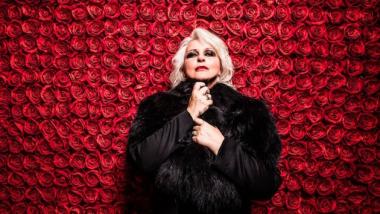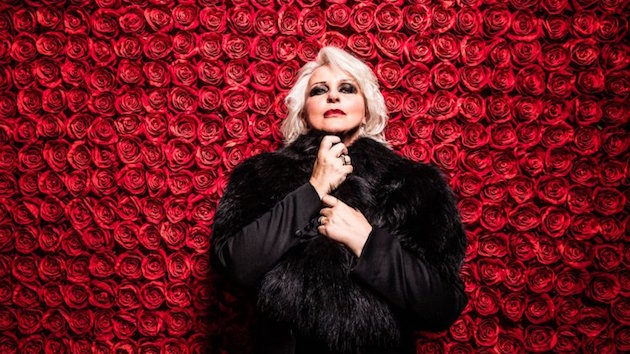
Fresh from a successful Ring Cycle in Vienna in April and scheduled to sing Isolde with the Berliner Staatsoper in Cologne in August, Iréne Theorin is unexpectedly filling out her summer with a full complement of Brünnhildes at San Francisco Opera’s Ring Cycle from June 12 to July 1.
Familiar to San Francisco audiences from opening the 2011 season as Turandot, the world renowned Swedish soprano has performed Brünnhilde at the Met, La Scala, and the Royal Opera. On what might have been a day off in a busy week of rehearsals, she made the time to sit down and discuss the ins and outs of being known for singing the heaviest roles in the biggest houses.
She entered the opera’s press room looking stylish and at ease in a shirt dress by Danish designer Malene Birger (one of her favorites), her signature thick black eyeliner and dark rimmed eyeglasses contrasting with short waves of white blond hair.
You’ve said that how well it goes when you jump in to a production depends in part on how complicated the staging is. How complicated is this staging? Scale of one to 10.
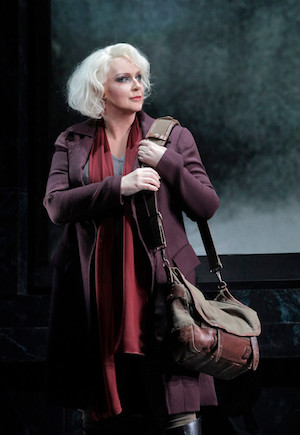
In Götterdämmerung you have the chorus, and the scene with the Walküres, but apart from that we are seldom more than three on stage in my scenes, so it’s a lot about getting the connection with the colleagues to make it work. The complications can be how many stairs you have, how many rocks to climb, how many ladders. That has to be rehearsed and safe. Once you know the distances, how the costume works, what shoes you’re wearing, then you get freedom. And that is my goal every time, to have control over all this practical stuff, so I can throw myself out there and not have to be concerned about it. Some small things came up. The shoes were slippery. It was like ice skating when I had them on the first time. But now it’s not such a jump in for me, I’ve had time to rehearse. On a scale of one to 10, I’d say this is a five, quite normal.
Can you explain why there are so many great sopranos from Sweden?
No. It probably has to do with many things. How we are built — we are big boned. If you look at the south European and the north European we look a bit different. We also have a good tradition. We sing a lot from childhood. I have grandchildren now and every time I meet them we sing. We connect through children’s songs. I can see in my 1-year-old grandchild when I sing the Swedish songs, he’s into it. You can see that he wants to sing even though he can’t speak. And that goes on also in the schools. It is a big part of our tradition in Sweden. I hope they keep it up, though it is lessening a bit. When we came together at this celebration [Birgit Nilsson’s 100th birthday] I was so happy to be a part of it. This mix we had with this wonderful soprano who is not even 30 yet, and me and Nina [Stemme] and Katarina [Dalayman] being the older generation, I felt satisfied to see that there are new singers and they are having the same energy, as they should, to get into the business. I think the stamina we have also. We know we have to work hard. That’s what I have. I started late but I was a good worker.
I heard that you sang all day yesterday and also last night. You have a reputation as someone who can sing and sing and sing.
And I’ve learned that by doing it. To jump in and remember a lot of staging, and work with the conductor directly with the orchestra without meeting him before. For me it’s about not making up problems before they are there. Like today. They said, “Oh, but it’s your day off.” Yes, I expected to have a day off, but it didn’t turn out that way. I have this, and I have a wig fitting, and that is what comes when you’re here a short time. I don’t put my energy into thinking, “How could they?” or “Why should I?” I’m here and I’m happy to be here. Today is a good day. Yesterday was another good day. I don’t know about tomorrow yet, but I don’t feel I’m going to catch any cold or anything, so that’s a good start for thinking tomorrow is going to be another good day.
It sounds very simple, which it isn’t. Some people think sometimes that I’m arrogant, but when they know me, and they know how hard I work, they know why I do it. I think that also has to do with being a mother. I was alone with the children for many years. There will always be things you have to solve, major things. One of my children had a cancer, my father died of a heart attack. Of course, in the morning I think, “Is my instrument OK today?” But I go have my porridge and after an hour, I’ll analyze my voice again. I had an accident as well, less than a year ago.
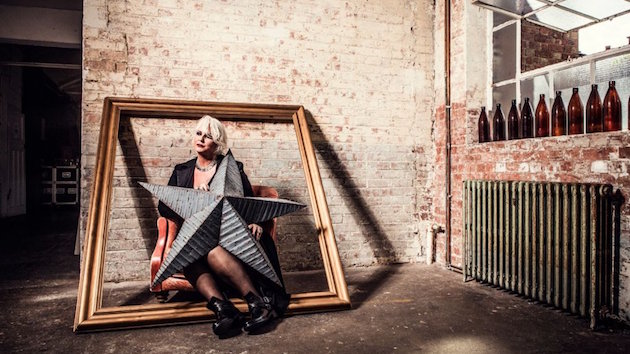
What happened?
I fell, and now I have titanium plates in my skull. When you open your eyes and you’re blind, sitting in a wheelchair, you don’t know anything. You just take this hour as this hour, and the next.
It wasn’t onstage, I hope.
No, I was out walking. I don’t mean to make a big thing about that, but I’m happy that I’m here and I’m singing. I have learned from singing that you have to be disciplined.
How different is Brünnhilde from Isolde, vocally?
I usually answer that by saying that Brünnhilde needs three operas and Isolde needs three acts to say the same thing. The are both clever girls and you have to stay clever in the way you sing it. I wouldn’t say that they are so different. You really have to have the stamina. Wagner did all four operas four days in a row, and I, too, made history less than a year ago and sang all three Brünnhildes in three days. And here, this is exceptional, I have nine performances in three weeks, and we have had rehearsals every day and the dress rehearsal. That would not happen with Isolde. Isolde is tricky in that she pours her whole soul out, these huge outbursts in the first act and then she has to have the pianissimo F sharp at the end. It’s a bit mean.
You have Ortrud [in Lohengrin] coming up. Did you sing Elsa as well?
Yes.
I would think that temperamentally you are more an Ortrud than an Elsa. Do you agree? And have you retired Elsa?
I didn’t retire Elsa, but the business probably did. [Laughs] I think I could probably do it. It depends on the cast and the theater. I haven’t been asked to do Elsa in 15 years.
They need you elsewhere, I suppose.
It’s a bit sad that the business is like that. When you get into doing these parts, Brünnhilde, Elektra, you are sort of stuck there. I’m happy to be stuck there.
Do you sing Elisabeth [in Tannhäuser] any more, or is it the same thing?
No. Of course I sing “Dich, teure Halle” in concerts, it comes up almost every year. I have a connection to it. But I’m really looking forward to doing my first Ortrud.
Would you say you have the classic temperament people expect from a dramatic soprano?
When I was a child, I had no idea I would be an opera singer. I was so scared of everything. I was very tiny. You could almost look though me. All the way up to gymnasium, I hated to stand up and talk. But at the same time, I was sometimes used to talk. People said, when you say something they listen, so if you start, we’ll start as well. I hated when teachers blamed someone unfairly. I was the first one to stand up and say, “No, it wasn’t him.” I grew up in a large family and you had to take your space.
How many children?
I have three brothers and two sisters.
Where are you?
I was number two, so I took a lot of responsibility. I was never pushed to do it, but when my brother was born when I was 12, I just took over, and my father let me do it.
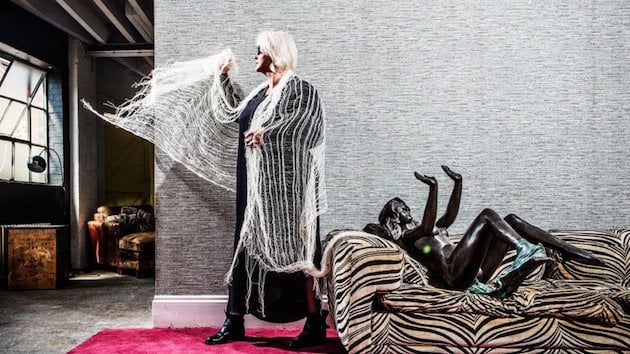
Maybe you and Brünnhilde have a few things in common.
When I started in the opera studio, I was asked to fill in as Brünnhilde in Götterdämmerung and I opened up and I could let everything go. It was freeing for me. The instructor of this production said I wouldn’t be surprised if you were doing this in a couple of years, and he was right. I did my first Sieglinde [in Die Walküre], and then I did Siegfried Brünnhilde before I did the other ones. But yes, it was me. I am grounded. If it’s stormy, I don’t try to go against the storm, but I wait out the storm and then I have my say. I am quite explosive as well.
Has that ever been a problem for you?
I have a temper in that respect. I can get angry. But when you get older, you know to choose your fights. I can be very straightforward and I think I’m known for that, but I hope people at the same time know that I’m not walking over any dead bodies. I don’t have the kind of sharp elbows that some people have in our business, and every business. But I have a temper, and when I don’t hold my horses, it costs a lot of energy, and I don’t like myself. I don’t scream and shout, but I’m quite impossible. [Laughs] Then I have to go away. In one rehearsal, not here, we had 20 minutes left and it was really over the top for everyone, and I said, “I better leave now,” and they said, “but the rehearsal is not over,” and I said, “I have to leave now.” No discussion. I just thought if I don’t leave now, I might say something. And they really didn’t need me.
Speaking of horses, what do you think of right at the moment you sing, “Grane, mein Ross”?
At the end? That is just a positive moment. For me it’s connection. Walküre and horses go together. We are one. For me to give my horse to Siegfried is a really big thing. The horse is almost more important than Siegfried. I’ve grown up with this horse, he is like a part of myself.
Here’s another musical moment: When Elektra realizes the stranger is her brother, what goes through your mind there?
Fear.
Fear of what?
Well, of course it’s love, but I didn’t expect this. I’ve waited so long. Maybe fear is the wrong word, but when you really wait for something to come and suddenly it’s there, you don’t, in that second, run to it.
It’s too overwhelming.
Yeah, it’s so much, it takes your breath away and you have to collect yourself. That is the turning point for Elektra, she is always like this [hunches and contracts] it is what she has been waiting for all these years. That is also where she starts to leave her body. She can relax. She gets disoriented in a way, and that is also in the music.
And what about the moment you mentioned, in “Liebestod” at the end of Isolde, the final leap up “höchste Lust!” for that last note.
Of course, there might be places where you have to think technique, but usually I have the opinion if you haven’t solved it before, it’s too late to do it onstage. I don’t call myself a singing teacher, but that is what I tell singers when they ask. “Don’t mark the difficult places. Mark everything that is easy. Do the difficult places over and over again.” Also when you have the stage rehearsals.
That is why you heard that I have been going hour after hour; you learn how to do it without always giving 100 percent. Sometimes at this final part I think, “I hope it will be there,” and sometimes I just know the voice is with me and I hope the muscles will do that for me. I also like to have a connection with the audience, as individuals, not as a group. Mainly I’m thinking, “Just say the words.” I’m not thinking of Iréne’s technique, I’m thinking of Isolde’s “Love-Death.”
What kind of changes have you noticed in the opera world since the #MeToo movement?
This is a big question. I am not the right person to ask about the developments going on because I’m not so informed. When the #MeToo movement started in Sweden, I also signed it, and then the newspapers called me or my manager, and I decided at that moment, I am not a front figure in that. I’m not the one who has been doing the work for it, and I should not be talking for all these people, so I withdrew from that and was giving other names. I so appreciate the work everyone is doing, because it is really needed.
I have always been a feminist but I wasn’t aware that I was, in a way. I grew up in a family where everyone was equal and everyone was the same. Even though I was a tiny girl, I was mainly playing with boys because that was who was around. I never felt that I wasn’t one of them, even if when we did the football games, I couldn’t be the best, but I was always welcome. I never felt less than until I went to school, when I was about 9, and began to realize “Oh, we are selected out by how good we are, not just that we should all do it together,” and that was for me a sad moment for me.
I think Sweden should be happy about where we are, because we are quite far ahead in equality, but still we have a long way to go. There are a lot of rules written on paper but it doesn’t really work on the daily basis. You have people who have been treated very badly by men, colleagues of family members and they are getting off easy, they are not punished enough.
I have to say about the #Metoo [movement], I have so many stories I could tell. Is that still on? [points to recorder].
Yes, do you want me to turn it off?
No, the opposite. What scares me is people already make jokes about it, and if that is the way it is, I worry we are not really taking care of one another. It is a power thing, and it’s so like what’s going on in the Ring. All these business people and how they use their power in the wrong way. My goal from the beginning has been to be a good example. I have three sons, and they would never do this, and I know that.
In Sweden we have this tradition of giving speeches on the eve of the first of May. We call it Valborgsmässoafton [Walpurgis Night]. Usually it is politicians, but I am well known, so I do that. Especially after the accident, I go out and tell my story. I was married to an alcoholic and he was hitting me, and I have had all the kinds of problems everyone has, and I feel more and more it is my responsibility to do that. I can talk about opera, and I love to do that, but when I get the chance I like to speak about the other things as well.

